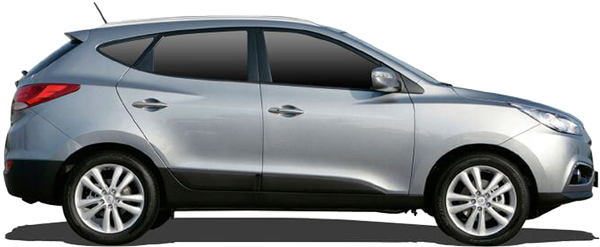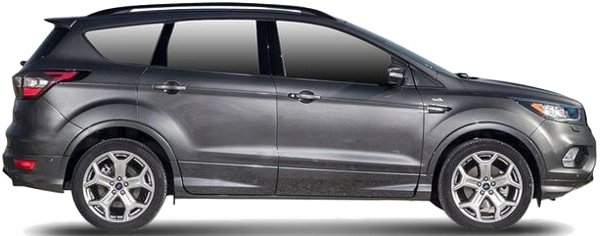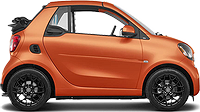The Comparative Analysis :
Hyundai ix35 2.0 4WD Automatic (13 - 15) vs. Ford Kuga 1.5 EcoBoost 4x4 Automatic (17 - 18)
€ 28,000

€ 31,200

€ 28,000
Base Price ⓘBase price of a new vehicle with standard equipment in Germany at market launch.
€ 31,200
ⓘBase price of a new vehicle with standard equipment in Germany at market launch. Price Info
Vehicle Dimensions
The Hyundai ix35 2.0 is slightly smaller in every dimension. It's 4.5 inches shorter, 0.7 inches narrower and 0.9 inches lower than the Ford Kuga 1.5 EcoBoost Start/Stopp.
Hyundai ix35 2.0
Ford Kuga 1.5 EcoBoost Start/Stopp
65.6
71.7
83.1
66.5
72.4
82.1
71.7 in
Width
72.4 in
83.1 in
Width Incl. Mirrors
82.1 in
65.6 in
Height
66.5 in
103.9
173.6
105.9
178.1
173.6 in
Length
178.1 in
103.9 in
Wheelbase
105.9 in
Vehicle Weight
Hyundai ix35 2.0
Ford Kuga 1.5 EcoBoost Start/Stopp
3404 lb
Curb Weight
3717 lb
4475 lb
Gross Vehicle
Weight
Weight
4850 lb

Weight Difference:
313 lb
8.42 %

General
Hyundai ix35 2.0
Ford Kuga 1.5 EcoBoost Start/Stopp
EL
Generation
DM2
Sport Utility Vehicle
Car Body Style
Sport Utility Vehicle
Mid-Grade Unleaded
Fuel Type
Mid-Grade Unleaded

On-demand four-wheel drive (4WD) with automatic engagement
Drivetrain
Permanent all-wheel drive (AWD)

6-speed automatic transmission
Transmission
6-speed automatic transmission
Engine
Hyundai ix35 2.0
Ford Kuga 1.5 EcoBoost Start/Stopp
Straight-four gasoline engine (naturally aspirated engine)
Engine Type
Straight-four gasoline engine with turbocharger
4
Valves
4
4
Cylinders
4
2 L / 98 cu in
Displacement
1.5 L / 73 cu in
164 hp
at 6200 rpm
Power
180 hp
at 6000 rpm
Hyundai ix35 2.0
164 hp
180 hp
Ford Kuga 1.5 EcoBoost Start/Stopp
151 lb‑ft
at 4000 rpm
Max. Torque
177 lb‑ft
at 1600 rpm
Hyundai ix35 2.0
151 lb‑ft
177 lb‑ft
Ford Kuga 1.5 EcoBoost Start/Stopp
Performance
Hyundai ix35 2.0
Ford Kuga 1.5 EcoBoost Start/Stopp
112 mph
Maximum Speed
124 mph
11 sec
Acceleration 0 to 62 mph
10.1 sec
62 mph
62
mph
mph
502 ft
0.000 sec

Hyundai ix35 2.0
62 mph
62
mph
mph
459 ft
0.000 sec

Ford Kuga 1.5 EcoBoost Start/Stopp
▶ REPLAY
20.76 lb/hp
Weight-to-Power Ratio
20.65 lb/hp
Hyundai ix35 2.0
20.76 lb/hp
20.65 lb/hp
Ford Kuga 1.5 EcoBoost Start/Stopp
Fuel Economy / Emissions
Hyundai ix35 2.0
Ford Kuga 1.5 EcoBoost Start/Stopp
Fuel Economy
28 mpg
combined
31 mpg
Hyundai ix35 2.0
28 mpg
31 mpg
Ford Kuga 1.5 EcoBoost Start/Stopp
21 mpg
city
25 mpg
36 mpg
highway
37 mpg
15.3 gal
Fuel Tank Capacity
15.9 gal
434 mi
Range
497 mi
Hyundai ix35 2.0
434 mi
497 mi
Ford Kuga 1.5 EcoBoost Start/Stopp
Environmental Impact
157.2 kWh
Total Energy Consumption
per 100 miles ⓘThe total energy consumption per 100 miles is the amount of energy consumed by a vehicle when burning fuel or using electricity per 100 miles (final energy), and the energy required to produce the appropriate amount of fuel or electricity (primary energy).
per 100 miles ⓘThe total energy consumption per 100 miles is the amount of energy consumed by a vehicle when burning fuel or using electricity per 100 miles (final energy), and the energy required to produce the appropriate amount of fuel or electricity (primary energy).
142.1 kWh
Hyundai ix35 2.0
157.2 kWh
142.1 kWh
Ford Kuga 1.5 EcoBoost Start/Stopp
Euro 5
Emission Standard
Euro 6b (NEFZ)
311 g/mi (NEFZ)
CO2 Emissions
278 g/mi (NEFZ)
Practical Convenience
Hyundai ix35 2.0
Ford Kuga 1.5 EcoBoost Start/Stopp
5
Doors
5
5
No. of Seats
5
1071 lb
Maximum Payload
1133 lb
16.7 cu ft
Trunk Volume
12.9 cu ft











40.7 cu ft
Cargo Volume (Seats Down)
46.8 cu ft

















